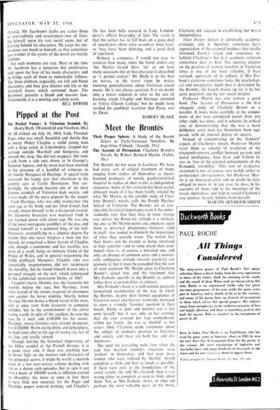Meet the Brontes
Their Proper Sphere. A Study of the Brontt Sisters as Early-Victorian Novelists. By Inga-Stina Ewbank. (Arnold, 35s.) THE Brontës do not cease to fascinate. We have had every sort of critical treatment of them, ranging from studies of themselves as incest- haunted producers of merely psychoanalytical material to studies of their works as independent structures. Some of this criticism has been useful, although much of it has been fatally vitiated by what Mr Martin, in his sensible study of Char- lotte Bronte's novels, calls the Purple Heather School of Criticism. The Brontes are of con- siderable historical importance, even if the under- standable view that their lives in some strange way mirror the Romantic attitude is a mislead- ing one; as Mr Martin points out, emphasis upon them as historical phenomena—however valid in itself—has tended to diminish the importance of what they actually wrote. The notion that their books can be treated as being unrelated to their separate—and to some extent their com- munal—lives is, of course, a mistaken one, and only an absence of common sense and a neuroti- cally ambiguous attitude towards creativity can promote it; but it must be conceded that the sort of stern attention Mr Martin gives to Charlotte Bronte's actual text, and the treatment that Mrs Ewbank accords to the Brontes as authors rather than as personalities, is salutary.
Mrs Ewbank's book is a well-written, precisely formulated examination of the way in which the Brontes, despite their formal acceptance of Victorian social and literary standards, managed to exert a strongly 'feminist' position in their novels. Emily as poet and novelist was a law unto herself; but it was only in her writings that she ever asserted her true womanhood: within her family she was as 'dutiful' as her sisters. Only Charlotte made statements about the subject of women's position in literature and society, and these are both few and dis- ingenuous.
She aped the prevailing male view when she said that married women's vocations were 'evident' in themselves, and that even those women who were isolated by 'destiny' should complain as little and bear as much as possible; if there were evils at the foundations of the social system, she told Mrs Gaskell, then it was wrong either to complain or even to think about them. Yet, as Mrs Ewbank shows, in what are perhaps the most valuable parts of her book, Charlotte did succeed in establishing her moral independence.
Their Proper Sphere is admittedly academic criticism, and it therefore sometimes lacks appreciation of the essential madness that totally informed Emily's vision and sometimes in- habited Charlotte's; but it is academic criticism somewhere near its best. The opening chapter on the position of woman novelists in Victorian times is one of the most valuable, if least satirical, appraisals of its subject; if Mrs Ew- bank's criticism sometimes lacks the psychologi- cal and imaginative depth that is demanded by the Brontës, she largely makes up for it by her quiet precision and by her social insights.
Professor Martin has also written a good book. The Accents of Persuasion is the first adequate study of Charlotte Brontë as a novelist. It looks more carefully at the compo- nents of her four completed novels than any other study has done: and it achieves its critical aim, of demonstrating that she was a more delibefate artist than has heretofore been sup- posed, with an unusual degree of success.
Instead of concentrating on the 'feminist' aspects of Charlotte's novels, Professor Martin treats them as vehicles of resolution of the nineteenth-century conflict between passion and moral intelligence. Jane Eyre and Villette he sees as 'two of the greatest achievements of the Romantic sensibility.' This sort of evaluative statement is not, of course, very useful, unless to professional abstractionists, but Professor Mar- tin is an American critic and no doubt he feels obliged to make it; in any case, he does, in his accounts of them, add to the meanings of the novels themselves, and help to reveal Charlotte's true motives (largely hidden from herself).
MARTIN SEYMOUR-SMITH


































 Previous page
Previous page